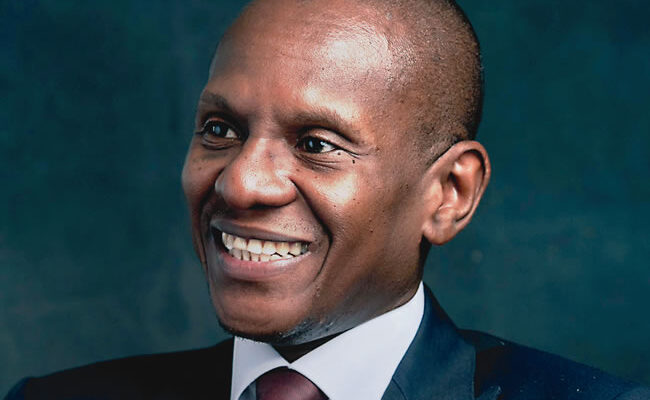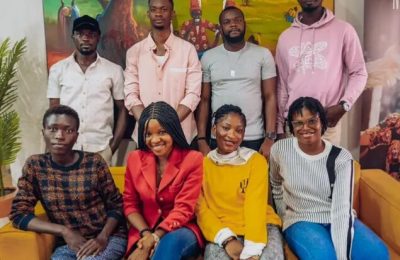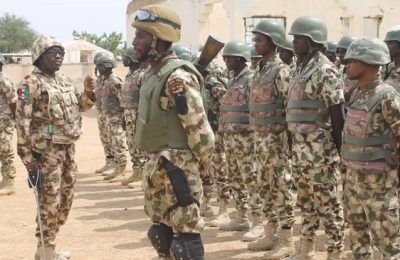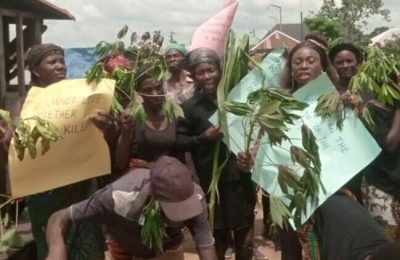

Mr Kolapo Kola-Daisi is the candidate of the Accord Party for Oyo South Senatorial race. In this interaction with journalists, he spoke on his decision to join the race, leadership, party politics and vote-buying. WALE AKINSELURE brings excerpts:
You have had a successful private life, why have you decided to come public by joining the Oyo South Senatorial race?

I am doing this because I think there is a lot I can offer my people of Oyo South. The issue we have in this country is not lack of money, corruption. The real issue we have is leadership. We that that been fortunate to travel the world, to see how things are being done in a proper manner believe that the time is right for us to start getting our hands dirty, getting involved in politics, being part of the decision. making process, policy-making process so that we can make decision and make policies for ourselves because we are the largest part of the population of this country.
Do you see any connection between monetisation of our politics and the kind of leadership we keep producing?

I don’t think we should kid ourselves. Politics is an expensive venture anywhere in the world. If you look at the kind of figures our colleagues across the seas in the United States of America spend on politics, you find that presidential election costs over $1billion. What we need to do in our own environment is there has been a big gap between what our leaders should have been doing and what they actually are doing now. If you look at the poverty rate in our country, we hear about 140 million people are currently in poverty. What that does is that people believe more in instant gratification over and above you telling them exactly what you will do for them. They want the fish rather than you teaching them how to fish. It seems that it is our leaders that are weaponising poverty because the longer they kept our people in poverty, the more they are able to control them with instant gratification like N1,000, N2,000. That is why you see people wanting to collect money on Election Day with the thinking that they will rather eat today than vote for somebody that will build or may not build me a road. We need to vote in leaders that we know are actually going to do well for our communities. We have 3.3million people registered to vote in Oyo State; only over one million people will come out to vote. But, the day that the governor of Oyo State needs three million people to vote for him to win an election, it is cheaper for him to perform in the four years he is in office than carrying cash around on Election Day to beg people to vote for him. We say that even if you would not be involved in politics directly, by seeking for elective office, we all need to come out and ensure that we vote. Let us increase our turnout ratio on Election Day from about 30 per cent to between 70 and 80 per cent. At that point, it will be too expensive for people to start buying votes; then, people will want to start listening to what you have, what you want to do for them. The INEC Chairman, Professor Mahmood Yakubu, while speaking at Chatham House London, spoke about the forthcoming elections being for the youth as about 40 per cent of the total registered voters are young people. Imagine if that 40 per cent is voting, and are voting in one direction, then we start to have leaders that are a bit more responsible. When we start having responsible leaders, we will start seeing that elections will less and less be about today’s money and will be more about what actually can you do for us. And, it should not be about blind party allegiance; you need to scrutinize; you need to understand the people behind those parties; the individuals that you will vote for because those are the ones that will actually determine whether they perform or not. It is about everybody getting involved in election process and electing responsible leaders.

What is your view on the nation’s party politics and the vote-buying?
We have democracy in a way but in another way, we don’t have democracy. This is because the eventual general election is by and large democratic but the party politics is not democratic. It is skewed towards people that have been there long time. Women, young people are generally disadvantaged. We have to appeal to those political parties to try and become more democratic in their process so that even those parties can bring up the best candidates for every single position otherwise Nigeria should start looking at bringing on board independent candidates if those political parties don’t want to reform themselves and be more democratic. When you join a political party, you want to run for a position, it should not be about age, your time of joining the party, it should be about what you can bring to the table. The constitution of the country supports the involvement of young people as it states that you only need to be 35years to be governor, 40 years to be president. I feel disappointed when people ask me, at 44 years, why I am going for Senate and not councilor, chairman, house of Assembly because it is my first time. I have been in employment for 22 years; I have had various qualification and by law, if you want to be encouraging and promoting young people, you should be asking why I am not vying for the highest office in the land. We look at other countries that we admire, the prime minister of the United Kingdom is about 42years; president of France was not up to 40 years when he assumed office; the president of Ukraine who has been able to resist the oppression of a much larger country is just over 40years. So, it is not about age, or years of being in politics; it is about commitment to be a good leader to your people. During my campaigns, I ask the people to try me and if I don’t do well in four years, please feel free not to vote me again. Turnout ratio will be a big way to minimize vote buying.
It’s your first venture into the political waters, what things have shocked you about our political practice and what have you learnt, thus far?
I don’t think anything can prepare you for the world of Nigerian politics, no matter how much preparation. The proverbial dropping somebody inside the deep end, that is, exactly what it is like. But, we must always have the ability to adapt. I have learnt a lot about myself. I did not know that I was as patient, loving, accommodating as I have been on this campaign journey. The beauty is about the journey is that when you have commitment to do well, you encourage yourself that all you want is to do well for the people of the constituency. I go out there and I have learnt that a lot of people are hungry, a lot of people are poor; a lot of people don’t have opportunity to do what they want to do. We weaponise poverty in this country. It is almost as if our leaders want to see us poor. In this election, more than ever, there will be a lot of surprises as people are no more interested in voting for voting sake. People want to vote for the people that they believe will do well for them. I have learnt about my constituency from Ibadan to Ido, Ibarapa to understand the peculiar issues in such places. For instance, there are places in Ibarapa where they have not been connected to the national grid, which is very sad. There is a lot of learning; personal learning, constituency learning, politics learning and so many things I have learnt and there is no other thing for me to do when I get to the Senate than to do well for our people. We need to move away from the politics of loyalty, favouritism, nepotism to politics of performance. The politicians we have, have set the performance level so low that doing one thing every six months will look like a big improvement to what other people have been doing. Just engaging the people of the constituency will go far above what anybody has done before. I don’t think four years is too long for anybody to do good things; I think four years is plenty time. There is a reason it is four years because you don’t want to start having individuals who become Lords and Kings wherever they are. The fact that you will come back to ask for votes means you should have done well in those four years. If you have a list of 10 things and you were able to deal with eight, I don’t think the people will mind too much about the remaining two. Four years is plenty time for anybody who wants to be serious to get things done. If in four years people don’t see a difference, I don’t think I deserve to be voted for if I ask for their votes again. People should able to demand for my scorecard. I also talk about priorities that we also have leaders who don’t necessarily prioritise things that impact the majority of the people. So, sometimes you think you have performed but peoples’ lives have not been impacted. For example, why is education always a small percentage of government?
You were reported to have won the first All Progressives Congress (APC) primary for Oyo South Senatorial district until the second primary which you lost. Have you healed of the APC wounds?
I don’t hold any grudges. People do things for various reasons. The norm in our political parties is that they are not democratic and they are the ones holding back this democracy. If someone had asked me before the APC primaries that if I lost, will I jump ship, my answer would have been no. I think that first primary was probably one of only fairly contested primary that we had in APC. The reason for that was that we had serving senator, former senator, former commissioner, former secretaries to the state government and there was Kolapo Kola-Daisi trying to muscle his way. If that first primary had gone to anybody else, the way it was conducted, and it wasn’t me, I would have been satisfied. But, what happened happened. What got me a bit uneasy was the process by which that primary was cancelled and re-done. Party has rules to cancellation of primaries which were not followed. It just felt that people sat in their room and decided that they did not want this young guy to contest. Generally, you find out that, in life, you make your own luck. I felt like that the aim was that they did not want Kolapo Kola-Daisi to contest. If after joining politics, I had been able to convince people to the point that they voted for me was good enough for me, to the point of winning a primary, let us forget for a second the controversy surrounding that primary, that was good enough. When I got into politics, with my father 90 years, I told my father that I am not asking him to make calls to his contacts to support my ambition but that I should be allowed to go out and do this for myself and not that I am using my father’s name to convince people to vote for me. Ultimately, the electorate will vindicate but I do not hold any grudges. There wasn’t a septic wound in the first place; it was more of disappointment. A lot of people you look up to as older people and those who should be encouraging younger people to get into this game early are the ones saying, I have to wait till my own time. I have now tried to take the message to the people and let them decide on who they think should represent them.
What edge do you think you have over other contestants, especially those of the APC and Peoples Democratic Party (PDP)?
Being younger is an edge. Forty percent of our electorate is under the age of 40. Seventy five percent of our current electorate is under the age of 50. If that constituents decide that they want to see more people like them in our political environment, that will be a big edge. The second edge is the political process itself in that we have been doing this for about 23 years and I am not sure that a lot of us who are younger can point to something that we will say that we have benefitted from this democracy. It is the names of the same people that have been around for a long time that we have been hearing. It is time for us to start asking them exactly what they have actually achieved. A lot of them will not have answers to that question, otherwise, we would not be where we are. Our society will be way better than it is now. We won’t have security, inflationary, poverty, unemployment challenges. People are tired of the same names, same faces and they want to see younger people with the background, experience to come and see if they can do things differently. Talking about family name, that is even added pressure because I don’t want to do anything to soil the name that my father has spent so long building. I see it as pressure not as something I use to sell actively.
What will be your priorities if elected member of the Senate?
Number one priority is to change the way people see politicians, change the way that we represent our own people. We will be very close to the people; we will not go out there and do things because we think it is cool. We want to be engaging people frequently; we want to feel their pulse; want to know the exact issues in our communities, markets, streets, homes, churches, mosques. We are elected by the people; we are not there out of our own doing; so we need to come home for people to understand what we are doing; they get feedback and we also get feedback from them to take back to represent them accordingly. Then, we need to find a way to take care of our young people. What the Senate offers is a platform in which we can do a lot more. I know that the general responsibility is oversight and passing legislations but it also provides a platform to do a lot more things. I have been in finance all my life and I know there are opportunities out there to be able to bring funding (bilateral, foundation, government) to help us to develop. You see politicians do empowerment and they give out motorcycles, deep freezers, clippers, grinding machines and I wonder what we are trying to achieve by this. Have the young people told us that they want to ride motorcycles? Is it that we don’t care of the health risks? You give motorcycle to a furniture maker. He rides it and gets injured or sells it and that money is wasted. Why don’t we do skill acquisition programmes for these people? When they finish that, put them in cooperative societies; put community leaders, faith leaders, inside that association and put in this funding such that they lending themselves so that they too can have businesses. People can start their own small businesses anywhere and their lives change. Those are the things we want to do apart from legislations and oversight. I think we can also legislate for economic development, youth empowerment. We can engage good companies and say if they hire 1,000 graduates a year and give them tax rebates, tax holidays because the governor cannot do everything. What you think you are losing in revenue, you are gaining in community development. In all the countries that we look at that are great, one thing they all have is that their people have access to funding, usually credit which is not available here. So, let us find our own way of doing those things so that we can improve the lives of our people. We need to empower our people but the empowerment should be knowledge and financial empowerment not motorcycle, freezer empowerment. We need to let our people be able to think and fend themselves as they wish to do.
ALSO READ FROM NIGERIAN TRIBUNE








